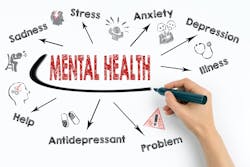Study: ACOs Having No Effect on Mental Health
A study published today in Health Affairs looked at a nationally representative sample of Medicare beneficiaries from 2016 to 2019 and found no differences in mental health between Medicare beneficiaries who received their healthcare through traditional fee-for-service programs and those enrolled in accountable care organizations.
The study was conducted by researchers at Washington University School of Medicine in St. Louis and the Yale School of Public Health. The researchers noted that the idea behind ACOs is that by integrating all health services into one system, patients will receive coordinated, high-quality care that will result in better health, thereby lowering health-care costs. The study’s findings indicate that the program as currently structured is not meeting the goal of improving mental healthcare.
“Accountable care organizations are the most important payment and care model in Medicare right now and they do not appear to have improved mental health treatment for the two most prevalent mental health conditions in our society, which are depression and anxiety disorders,” said senior author Kenton Johnston, Ph.D., an associate professor of medicine at Washington University, in a statement. “In this study, only about half the people with depression or anxiety got any outpatient mental healthcare at all — and those in accountable care organizations got even less. People are supposed to get treatment for depression, anxiety, any kind of mental health condition in the same way they get treatment for diabetes or kidney disease but, in reality, that doesn’t really happen. There are changes that can be made to help get people the care they need.”
Overall, in 2022, the Medicare Shared Savings Program saved Medicare $1.8 billion without compromising quality of care, according to a report from the Centers for Medicare and Medicaid Services.
But the report’s authors say less is known about whether such organizations are actually making people healthier. To determine the effect of ACOs on mental health, Johnston and lead author Jason M. Hockenberry, Ph.D., the chair of the Department of Health Policy and Management at the Yale School of Public Health, used de-identified data from the Medicare Current Beneficiary Survey to find Medicare recipients with diagnosed and undiagnosed depression and anxiety who switched to an accountable care organization between 2016 and 2019. In total, the researchers collected and analyzed 2,500 patient-years of data.
The results were clear: Among patients not initially enrolled in an accountable care organization, those who switched to one were no more likely to get mental health treatment and saw no improvements in their symptoms after a year compared to those in regular Medicare.
“Overall, accountable care organizations had no effect on the quality of mental healthcare: All the outcome measures were zero except for one treatment measure for depression, which was actually worse,” Johnston said.
The researchers say the problem is at least partly due to the incentive structure for doctors and hospitals. Figuring out how to measure quality of care and calculate fair payment is complicated, and Medicare may not have found the right formula for mental health.
“Medicare risk adjustment models, which ultimately determine payment to accountable care organizations, tend to under-predict costs for people with depression and anxiety, so there’s not as much incentive and resources for treating those conditions,” Johnston added. “Right now, anxiety is not even included in the model, which often means accountable care organizations are underpaid for treating patients with these conditions. Some forms of depression are in the model, but not others. We need to have more incentives and accompanying financial resources directed toward caring for people with mental-health conditions.”
Johnston says he sees hope for improvement in the changing political climate. The pandemic both highlighted and exacerbated mental health challenges, and as a result policymakers have taken an increased interest in addressing such conditions.
“The Department of Health and Human Services recently issued new guidelines around getting people the mental healthcare they need,” Johnston said. “My hope is that this study will get policymakers to look at mental-health quality measures in a more specific way.”


